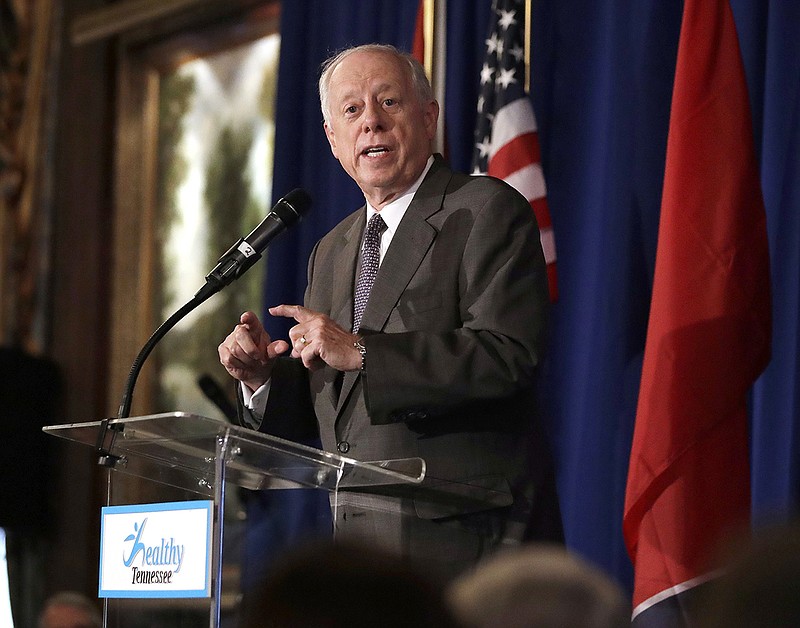Former Democratic Tennessee Gov. Phil Bredesen is hoping to pick up Republican votes in his bid for the United States Senate with a series of proposals he calls "fresh ideas."
For him to win in a state that has become far more Republican than when he won his last statewide race in 2006, he has to pick up GOP votes. So the "fresh ideas," whether or not they could ever see the light of day in Washington, D.C., must at least sound conservative.
The latest, unveiled Tuesday during a speech to the Chattanooga Chamber of Commerce, is for the country to once again achieve a balanced budget. The idea, he said "is simple": Hold federal budget spending (excepting Social Security) at the current level for the next nearly six years, grow federal tax revenue at 5.15 percent per year, and, voilá, the budget will be balanced in 5.7 years.
In other words, the country would have to behave like most families and most states do - not spend more than it earns.
"Everyone gives lip service to fixing the deficit," he said, "but there is no action. Democrats - my own party - have never been great on the subject, but since the Reagan era, Republicans have completely fallen off the wagon as well."
Bredesen, of course, knows the latter part of his statement is not quite so.
The country achieved a balanced budget during Bill Clinton's presidency in the late 1990s, but it took Republicans forcing spending cuts to get there. The early 2000s might have seen further budget discipline under Republican President George W. Bush, but a little incident known as 9/11 intervened. Then, in Republican President Donald Trump's early months in office, he proposed cuts of $54 billion in the federal budget to close the spending gap.
Bredesen's party, though, gives no thoughts whatsoever to holding the line on spending. In fact, the leading 2020 Democratic presidential candidates have made proposals that not only wouldn't keep spending where it is but would increase it dramatically. They want total government-run health care (they call it Medicare for All), free college tuition and a $15-an-hour (or more) minimum wage.
The former Tennessee governor knows he would get nowhere in a Democratic-run Congress with his idea and not much farther in a Republican-run Congress because of opposition from members of his own party.
No, while we believe Bredesen does understand the importance of balancing the budget, and while we accept the simple math of the Bredesen proposal, we believe he knows such a proposal has little chance of succeeding. But it sounds good to GOP voters in a state where voters understand universal health, free college tuition and a giant minimum-wage hike are pie-in-the-sky ideas.
Sadly, a Bredesen campaign news release explaining his proposal reverts to the usual playbook, blaming his opponent, Republican Marsha Blackburn, for the swollen national debt and deficit. But the debt, during Blackburn's 16 years in Congress, grew the most either during Democratic control of Congress or under Democratic President Barack Obama. The deficit grew the most when Democrats were in control of Congress during the Great Recession, fell during four years under Obama (three after Republicans won the U.S. House) and began rising again before Obama left office.
Does Blackburn deserve blame? No more than any other single member of Congress and certainly less than Democrats, who are averse to spending cuts.
Bredesen, though, in opposition to Blackburn's suggested fiduciary foolishness, casts himself as a knight in fiscally shining armor by dragging out tired rhetoric that ought to have been put to bed. "[W]e balanced eight consecutive budgets," he told the Chamber of Commerce.
Of course, he did. The Tennessee Constitution both requires the governor to submit a balanced budget and the legislature to pass one. He had no choice in the matter.
But suppose Bredesen were elected and introduced his proposal to Congress. How do current Democratic Senate Minority Leader Chuck Schumer and Democratic House Minority Leader Nancy Pelosi feel about balanced budgets?
In 1995, when Clinton and Republicans were trying to come to the agreement that eventually led to several balanced budgets, Schumer said such an idea would devastate state governments that rely on federal aid and bring more suffering on the poor and welfare recipients. In 2011, he said, "[T]he Republican approach of 'cut, cut, cut' has undermined our economic recovery." In 2018, he called a balanced-budget vote a "Kabuki theater-like sham."
Pelosi said in 2007 a proposed budget by then-President George W. Bush that would balance the budget by 2012 was "more of the same fiscal irresponsibility and misplaced priorities." In 2011, she said a balanced-budget amendment would promote "further brinksmanship and uncertainty," would "destroy 15 million jobs, double the employment rate" and "cause the economy to shrink." In 2018, she called such an idea a "cynical attack on social safety net programs, such as Medicare and Medicaid."
So, Bredesen's "new idea" may sound good to conservative ears, is simple from a math standpoint and certainly would be good for the country in achieving spending restraint. But getting it past his colleagues and making it stick are two other things entirely. Sometimes, in fact, reality bites.
